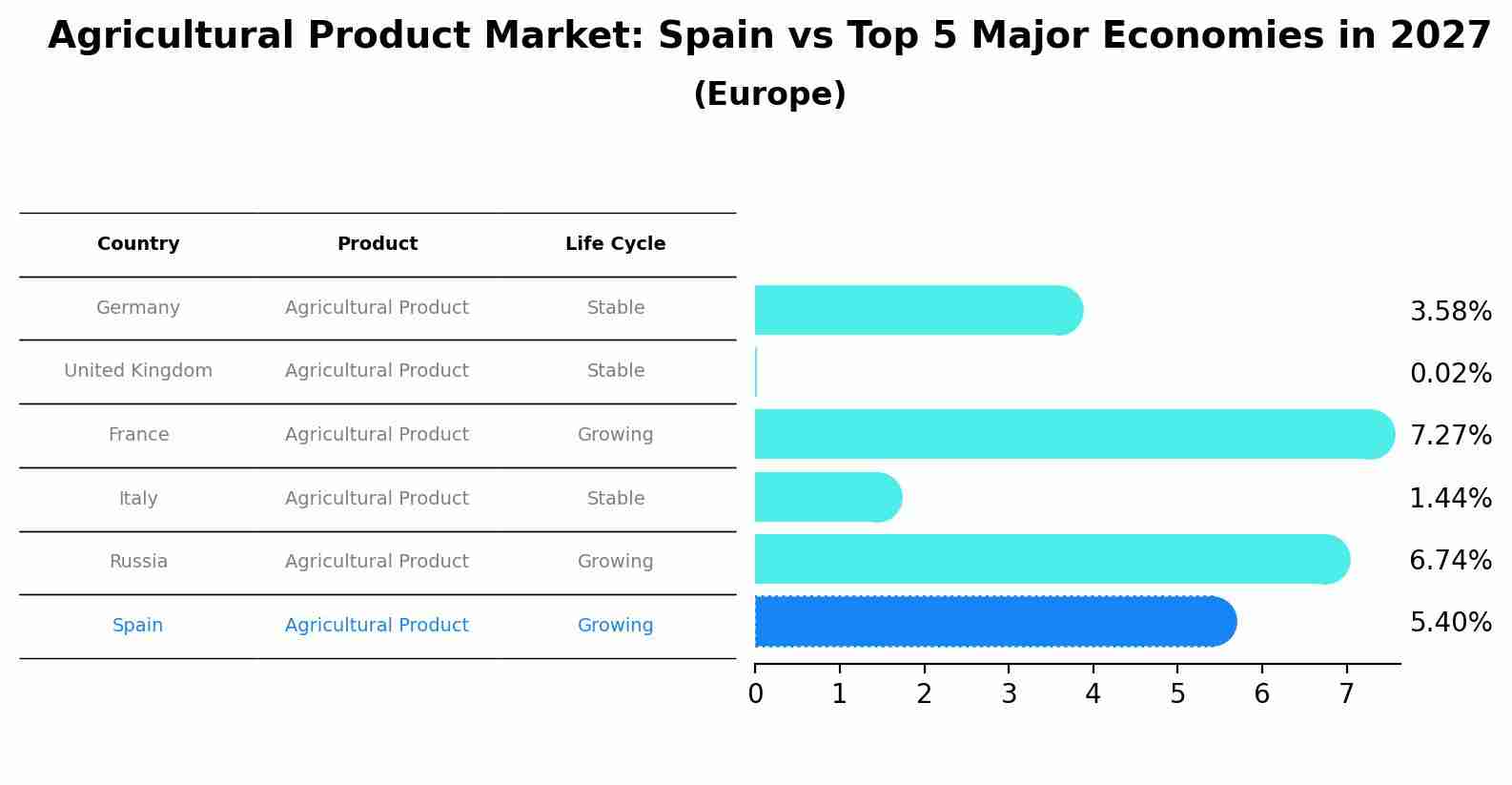Spain Agricultural Product Market Outlook | Share, Companies, Growth, Industry, Trends, Analysis, Forecast, COVID-19 IMPACT, Size, Value & Revenue
| Product Code: ETC379634 | Publication Date: Aug 2022 | Updated Date: Jul 2025 | Product Type: Market Research Report | |
| Publisher: 6Wresearch | Author: Shubham Padhi | No. of Pages: 75 | No. of Figures: 35 | No. of Tables: 20 |
Spain Agricultural Product Market Size Growth Rate
The Spain Agricultural Product Market is projected to witness mixed growth rate patterns during 2025 to 2029. From 6.58% in 2025, the growth rate steadily ascends to 7.66% in 2029.

Agricultural Product Market: Spain vs Top 5 Major Economies in 2027 (Europe)
In the Europe region, the Agricultural Product market in Spain is projected to expand at a growing growth rate of 5.40% by 2027. The largest economy is Germany, followed by United Kingdom, France, Italy and Russia.

Spain Agricultural Product Market Synopsis
The Spain Agricultural Product Market is diverse and vibrant, encompassing a wide range of products including fruits, vegetables, cereals, dairy products, and olive oil. Spain is a major producer of olive oil, being the largest producer in the world. The country is also known for its citrus fruits, wine, and various vegetables such as tomatoes and peppers. The agricultural sector in Spain benefits from a favorable climate, advanced technology, and a strong tradition of farming. The market is characterized by a mix of large commercial farms and small family-owned operations, with a focus on quality and sustainability. Spain`s agricultural products are highly regarded both domestically and internationally, contributing significantly to the country`s economy.
Spain Agricultural Product Market Trends
In the Spain Agricultural Product Market, some current trends include a growing demand for organic and sustainable products, driven by increasing consumer awareness of health and environmental issues. This has led to a rise in the production of organic fruits, vegetables, and dairy products. Additionally, there is a shift towards precision agriculture technologies to improve efficiency and productivity in farming practices. The market is also seeing a focus on innovation and technology adoption in areas such as crop monitoring, irrigation systems, and data analytics. Furthermore, there is a growing interest in locally sourced and artisanal products, as consumers seek authenticity and traceability in their food choices. Overall, these trends indicate a market that is evolving towards more sustainable and technologically advanced agricultural practices to meet the demands of a changing consumer landscape.
Spain Agricultural Product Market Challenges
In the Spain Agricultural Product Market, some of the key challenges faced include increasing competition from international markets, fluctuating weather conditions affecting crop yields, rising production costs, and evolving consumer preferences towards organic and sustainable products. Additionally, the sector is grappling with issues related to land fragmentation, an aging farming population, and limited access to modern technology and innovation. The market also faces regulatory challenges such as compliance with EU agricultural policies and environmental regulations. To remain competitive, stakeholders in the Spain Agricultural Product Market need to adapt to these challenges by investing in sustainable practices, adopting new technologies, improving supply chain efficiencies, and diversifying their product offerings to meet changing consumer demand.
Spain Agricultural Product Market Investment Opportunities
Investment opportunities in the Spain Agricultural Product Market include the potential to invest in innovative agricultural technologies such as precision farming, hydroponics, and vertical farming to increase productivity and sustainability. Additionally, there is a growing demand for organic and locally sourced products, presenting opportunities for investors to support and capitalize on the trend towards healthier and more sustainable food options. Investing in agricultural land or partnering with local farmers to expand production capacity and diversify crops can also be lucrative in the Spain market. Furthermore, there is a growing interest in agri-tourism, offering opportunities for investors to develop agritourism projects that combine agriculture with tourism activities to attract visitors and generate additional revenue streams.
Jordan Agar Market Government Policies
The Spain Agricultural Product Market is regulated by a number of government policies aimed at supporting sustainable agriculture and ensuring food security. Some key policies include the Common Agricultural Policy (CAP) of the European Union, which provides financial support to farmers, promotes rural development, and ensures the competitiveness of the agricultural sector. Additionally, Spain has its own national agricultural policies that focus on promoting organic farming, improving irrigation systems, and supporting small-scale farmers. The government also implements measures to address environmental concerns, such as water management and biodiversity conservation. Overall, the combination of EU and national policies in Spain`s Agricultural Product Market aims to balance economic development with environmental sustainability and social welfare.
Spain Agricultural Product Market Future Outlook
The future outlook for the Spain Agricultural Product Market appears positive, with growth expected in various sectors such as organic farming, technology adoption, and sustainable practices. Spain is a key player in the European agricultural market, with a strong focus on olive oil, wine, fruits, and vegetables. As consumer demand for organic and locally sourced products continues to rise, Spanish farmers are likely to invest more in sustainable practices to meet these preferences. Additionally, advancements in technology, such as precision agriculture and automation, are expected to improve efficiency and productivity in the sector. Overall, the Spain Agricultural Product Market is poised for growth and innovation in the coming years, driven by changing consumer preferences and technological advancements.
Key Highlights of the Report:
- Spain Agricultural Product Market Outlook
- Market Size of Spain Agricultural Product Market, 2021
- Forecast of Spain Agricultural Product Market, 2031
- Historical Data and Forecast of Spain Agricultural Product Revenues & Volume for the Period 2018 - 2031
- Spain Agricultural Product Market Trend Evolution
- Spain Agricultural Product Market Drivers and Challenges
- Spain Agricultural Product Price Trends
- Spain Agricultural Product Porter's Five Forces
- Spain Agricultural Product Industry Life Cycle
- Historical Data and Forecast of Spain Agricultural Product Market Revenues & Volume By Type for the Period 2018 - 2031
- Historical Data and Forecast of Spain Agricultural Product Market Revenues & Volume By Food for the Period 2018 - 2031
- Historical Data and Forecast of Spain Agricultural Product Market Revenues & Volume By Fiber for the Period 2018 - 2031
- Historical Data and Forecast of Spain Agricultural Product Market Revenues & Volume By Fuel for the Period 2018 - 2031
- Historical Data and Forecast of Spain Agricultural Product Market Revenues & Volume By Raw Material for the Period 2018 - 2031
- Historical Data and Forecast of Spain Agricultural Product Market Revenues & Volume By Application for the Period 2018 - 2031
- Historical Data and Forecast of Spain Agricultural Product Market Revenues & Volume By Direct Consumption for the Period 2018 - 2031
- Historical Data and Forecast of Spain Agricultural Product Market Revenues & Volume By Food & Fabrics for the Period 2018 - 2031
- Historical Data and Forecast of Spain Agricultural Product Market Revenues & Volume By Construction & Paper Products for the Period 2018 - 2031
- Historical Data and Forecast of Spain Agricultural Product Market Revenues & Volume By Others for the Period 2018 - 2031
- Historical Data and Forecast of Spain Agricultural Product Market Revenues & Volume By Industry Vertical for the Period 2018 - 2031
- Historical Data and Forecast of Spain Agricultural Product Market Revenues & Volume By Food & Nutrition for the Period 2018 - 2031
- Historical Data and Forecast of Spain Agricultural Product Market Revenues & Volume By Sustainable Agribusiness for the Period 2018 - 2031
- Historical Data and Forecast of Spain Agricultural Product Market Revenues & Volume By Production & Harvesting for the Period 2018 - 2031
- Historical Data and Forecast of Spain Agricultural Product Market Revenues & Volume By Agribusiness Technological Inputs for the Period 2018 - 2031
- Historical Data and Forecast of Spain Agricultural Product Market Revenues & Volume By Others for the Period 2018 - 2031
- Spain Agricultural Product Import Export Trade Statistics
- Market Opportunity Assessment By Type
- Market Opportunity Assessment By Application
- Market Opportunity Assessment By Industry Vertical
- Spain Agricultural Product Top Companies Market Share
- Spain Agricultural Product Competitive Benchmarking By Technical and Operational Parameters
- Spain Agricultural Product Company Profiles
- Spain Agricultural Product Key Strategic Recommendations
Frequently Asked Questions About the Market Study (FAQs):
- Single User License$ 1,995
- Department License$ 2,400
- Site License$ 3,120
- Global License$ 3,795
Search
Thought Leadership and Analyst Meet
Our Clients
Related Reports
- Afghanistan Apparel Market (2026-2032) | Growth, Outlook, Industry, Segmentation, Forecast, Size, Companies, Trends, Value, Share, Analysis & Revenue
- Canada Oil and Gas Market (2026-2032) | Share, Segmentation, Value, Industry, Trends, Forecast, Analysis, Size & Revenue, Growth, Competitive Landscape, Outlook, Companies
- Germany Breakfast Food Market (2026-2032) | Industry, Share, Growth, Size, Companies, Value, Analysis, Revenue, Trends, Forecast & Outlook
- Australia Briquette Market (2025-2031) | Growth, Size, Revenue, Forecast, Analysis, Trends, Value, Share, Industry & Companies
- Vietnam System Integrator Market (2025-2031) | Size, Companies, Analysis, Industry, Value, Forecast, Growth, Trends, Revenue & Share
- ASEAN and Thailand Brain Health Supplements Market (2025-2031) | Strategy, Consumer Insights, Analysis, Investment Trends, Opportunities, Growth, Size, Share, Industry, Revenue, Segments, Value, Segmentation, Supply, Forecast, Restraints, Outlook, Competition, Drivers, Trends, Demand, Pricing Analysis, Competitive, Strategic Insights, Companies, Challenges
- ASEAN Bearings Market (2025-2031) | Strategy, Consumer Insights, Analysis, Investment Trends, Opportunities, Growth, Size, Share, Industry, Revenue, Segments, Value, Segmentation, Supply, Forecast, Restraints, Outlook, Competition, Drivers, Trends, Demand, Pricing Analysis, Competitive, Strategic Insights, Companies, Challenges
- Europe Flooring Market (2025-2031) | Outlook, Share, Industry, Trends, Forecast, Companies, Revenue, Size, Analysis, Growth & Value
- Saudi Arabia Manlift Market (2025-2031) | Outlook, Size, Growth, Trends, Companies, Industry, Revenue, Value, Share, Forecast & Analysis
- Uganda Excavator, Crane, and Wheel Loaders Market (2025-2031) | Strategy, Consumer Insights, Analysis, Investment Trends, Opportunities, Growth, Size, Share, Industry, Revenue, Segments, Value, Segmentation, Supply, Forecast, Restraints, Outlook, Competition, Drivers, Trends, Demand, Pricing Analysis, Competitive, Strategic Insights, Companies, Challenges
Industry Events and Analyst Meet
Whitepaper
- Middle East & Africa Commercial Security Market Click here to view more.
- Middle East & Africa Fire Safety Systems & Equipment Market Click here to view more.
- GCC Drone Market Click here to view more.
- Middle East Lighting Fixture Market Click here to view more.
- GCC Physical & Perimeter Security Market Click here to view more.
6WResearch In News
- Doha a strategic location for EV manufacturing hub: IPA Qatar
- Demand for luxury TVs surging in the GCC, says Samsung
- Empowering Growth: The Thriving Journey of Bangladesh’s Cable Industry
- Demand for luxury TVs surging in the GCC, says Samsung
- Video call with a traditional healer? Once unthinkable, it’s now common in South Africa
- Intelligent Buildings To Smooth GCC’s Path To Net Zero


















